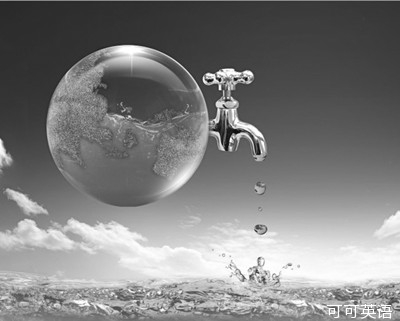Since 1900, the U.S. has pulled enough water from underground aquifers to fill two Lake Eries. And in just the first decade of the 21st century, we've extracted underground water sufficient to raise global sea level by more than 2 percent. We suck up 25 cubic kilometers of buried water per year.
自1900年起,美国从地下蓄水层抽的水足够填满两个伊利湖。仅在21世纪第一个10年内,人类抽取的地下水足够让海平面上升2%。每年我们要消耗25立方公里的地下水。

That's the message from the U.S. Geological Survey's evaluation of how the U.S. is managing its aquifers. Or mismanaging. For example: water levels in the aquifer that underlies the nation's bread basket have dropped in some places by as much as 160 feet.
这就是美国地质调查局对美国如何管理地下水进行评估后传达的信息。也可以说水资源管理不善。例如:位于国家粮仓之下的地下蓄水层的某些地方的水位已经下降了160英尺。
The rest of the world isn't doing any better. A conference of water scientists just issued the so-called Bonn Declaration, which declares that this lack of foresight will cause the majority of people alive in 2050 to face "severe" freshwater shortages.
世界上其它的地方也好不到哪去。科学家们在记者会上发布了所谓的伯恩宣言,声明这种缺乏远见的做法会让2050年的人类陷入严重的饮用水短缺危机中。
Mismanagement of water resources is a hallmark of this new human-dominated era in the Earth's geologic history, known as the Anthropocene. Despite building, on average, one large dam every day for the last 130 years, we use more water than we store. And we're letting that freshwater escape to the seas. Which means we may find ourselves with water, water everywhere, but not much fit to drink.
水资源的管理不善是地球地质历史(称作人类纪)上新人类统治时代的一个标志。过去130年人类平均每天建立一座大坝,即使这样人类使用的水比储存的更多。我们在让淡水汇入海洋,这将意味着我们身边到处是水,但都不适合饮用。












